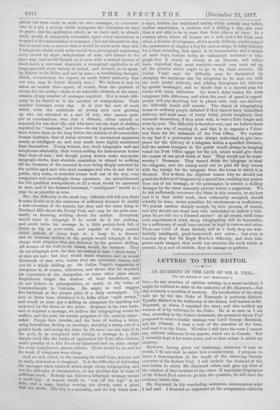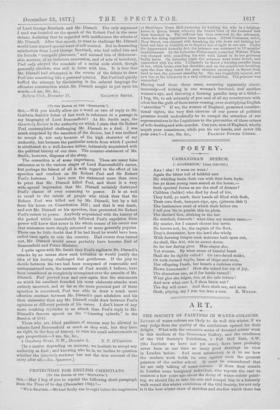LETTERS TO THE EDITOR.
AN INCIDENT IN THE LIFE OF SIR H. PEEL. -
[TO TUE EDITOR OF THE " SPINTATOR.1
Sin,—In any question of opinion relating to a social incident, I might be inclined to defer to the authority of Mr. Hayward,—but this is merely a question of memory. My recollection of the story told me by the late Duke of Newcastle is perfectly distinct. Equally distinct is the testimony of the friend, well known to Mr. Hayward, to whom I repeated the story, and who verified my version of it by reference to the Duke. He is as sure as I am that, according to the Duke's statement, the person to whom Peel proposed to send a hostile message was Lord George Bentinck, not Mr. Disraeli. I took a note of the anecdote at the time, and read it to the Duke. Whether I still have the note I cannot say, without reference to my papers, which are in Canada. But I certainly kept it for some years, and to that extent it aided my memory.
However, having given my testimony, whatever it may be worth, I do not wish to enter into a controversy. I propose to leave a memorandum in the hands of the surviving literary executor of Sir Robert Peel. I will include the incident of the two letters to which Mr. Hayward refers, and give my view of the relation of that incident to the other. If any future biographer of Sir Robert Peel cares to go into the question, he will have the evidence before him.
Mr. Hayward, in his concluding sentences, misconstrues what I had said. I founded no argument on the comparative celebrity of Lord George Bentinck and Mr. Disraeli. The only argument I used was founded on the speech of Sir Robert Peel in the same debate, declaring that he regarded with indifference the attacks of Mr. Disraeli. After that speech, to want to challenge Mr. Disraeli would have argued special want of self-control. But in demanding satisfaction from Lord George Bentinck, who had called him and his friends "renegade placemen," and accused him of dishonour- able motives, of an insincere conversion, and of acts of treachery, Peel only obeyed the mandate of a social code which, though generally obsolete, was still in force with him. It is true that Mr. Disraeli had attempted in the course of the debate to draw Peel into something like a personal quarrel. But Peel had quietly baffled the attempt, by disclaiming in the calmest language the offensive construction which Mr. Disraeli sought to put upon his words.—I am, Sir, &c.,







































 Previous page
Previous page